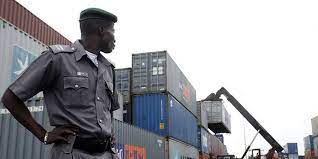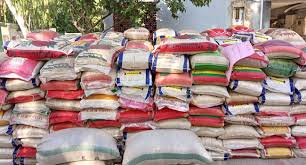The Nigerian government announced Tuesday that Nigerian importers would soon be free to legally import their goods from the ports in Cotonou, Benin Republic.

The acting Comptroller-General of the Nigeria Customs Service (NCS), Bashir Adeniyi, disclosed this while speaking to journalists after a two-day working visit of Alain Hinkati, Director-General of Customs, Republic of Benin, to Nigeria.
In August 2019, the federal government ordered the closure of land borders to halt smuggling along the borders.

However, the government in 2021 opened border points across the country, Seme, in the South-west, Ilela and Maitagari in the North-west, and Mfun in the South-south.
The government maintained that the ban on the importation of rice, poultry, and other products still subsists.
Speaking on Tuesday, Mr Adeniyi said the decision to set up a clearing point for Nigeria-bound goods was one of the highlights of the two-day working visit of the Director-General of Customs, Republic of Benin, to Nigeria.

“We are building confidence in the system offered by the Republic of Benin. Our importers are using their ports and vice-versa. If there are people in the Benin Republic who want to use our ports, we try to build trust in our systems.
“By this agreement, what it means is that Nigerian importers willing to use the ports in Cotonou can have their goods cleared in those ports because there would be an opportunity for them to pay duties on goods that are liable for payment of duties.
“We can account for the duties on those goods in the ports of arrival. So they will now be free to enter Nigeria,” Mr Adeniyi said.

Speaking on the promotion of the ECOWAS trade liberalisation scheme, he said the relevant department within the Nigeria Customs Service has been entrusted with the task of reviewing the current impediments to the ECOWAS trade liberalisation scheme to chart practical ways forward.
“Our objective remains steadfast to stimulate economic growth, foster regional integration, and nurture prosperity among our nations.
“In collaboration with the Inspector General of the Nigeria Police, we have undertaken substantial measures to reduce barriers along our trade corridors.
“This was done within three weeks of my return by addressing these challenges, we are fostering a more conducive environment for legitimate trade to flourish,” he said.

Digital Innovation
He explained that the NCS is currently in the final stages of integrating its IT systems with the Federal Road Safety to curb illegal entry of vehicles.
“This integration will enhance our ability to monitor and regulate cross-border vehicle movements more effectively,” he said.
“Initiatives have been launched to harmonise the list of products prohibited in Nigeria.”
This step, he said, not only promotes consistency but also facilitates smoother trade relations with its partners.
“We are swiftly progressing toward Nigeria’s integration into the Interconnected System for the Management of Goods in Transit (SIGMAT), joining hands with other West African nations.

“This interconnected system promises to further streamline our transit operations and improve regional trade dynamics,” he said.
In strengthening the fight against cross-border crime, he said the NCS’ commitment to combating cross-border crime is unwavering.

“We are actively engaging in cooperation, intelligence sharing, and resource pooling with our regional partners to ensure the security and safety of our shared borders.
“We have honoured our commitment to holding bi-annual meetings to discuss matters of common interest.
“These meetings provide a vital platform for dialogue and cooperation, strengthening our regional customs community,” he added.
He noted that the NCS has been working diligently to engage with border communities.
“Nigeria Customs Service is currently developing plans to incorporate border communities as a priority in its Corporate Social Responsibility Strategy. We are also promoting professionalism and tax compliance among our customs officers.
“Our efforts to secure the international supply chain remain a top priority, as we continue to implement measures that safeguard trade while ensuring the highest standards of security,” Mr Adeniyi said.
He said the return visit provides a great opportunity to align the framework of ongoing consultations with that of its neighbouring customs administration.
“Over the last 24 hours, we have been able to leverage our shared commitment to meaningful cooperation to consider and make progress on issues like managing the transit of goods through the territories, the use of our ports by importers of the countries and the issue of prohibited goods.
“These accomplishments are a testament to the dedication in collaboration with our regional partners.
“However, we acknowledge that our journey is far from complete. The challenges we face require our continued commitment and resolve to overcome them,” he noted.
Mr Adeniyi said: “As we solidify these gains, we must also look ahead with a sense of urgency. The demands of our evolving global landscape require us to adapt and innovate at an accelerated pace.
“Together, we shall work tirelessly to further enhance customs processes, trade facilitation, and regional integration.”
“Let us recommit ourselves to the noble cause of promoting economic prosperity, peace, and stability within the West African region.
ALSO READ: Niger Coup: Customs boss urges vigilance at Benin Republic, Cameroon borders
“The advancements we celebrate today serve as a foundation for the even greater achievements that lie ahead. I am confident that our collective efforts will continue to yield positive outcomes, ultimately benefiting our nations and our people,” he said.
In his speech, Mr Hinkati called for trade facilitation and sub-regional trade between the two countries.
“We need to improve our trade facilitation. What we have done here is to deepen the discussions we had in Benin. We need concrete steps to have results.
“The framework we are coming up with for Nigeria-bound goods to be cleared in the Benin Republic and vice versa is the way to go with facilitating trade between both countries.
“We want to ensure all obstacles to trade are dealt with,” he said.
In his remark, the Nigerian ambassador to the Benin Republic, Olukayode Olugbenga, said the partnership is great for both countries.
“I observed the need for Nigeria to change the way of doing things in our land borders. We are cementing our trade relations with the Benin Republic and there is already a robust goodwill and political thrust to make it happen,” Mr Olugbenga said.